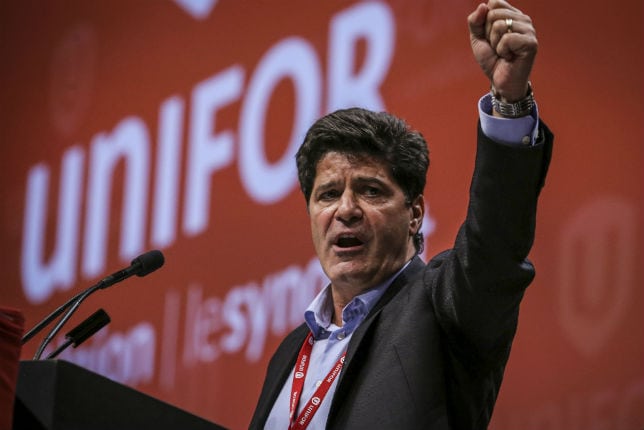
Union president undeterred by Washington bill making WHL players amateurs
Legislators in the state of Washington recently passed a bill rendering players for WHL teams in that state as amateurs and not employees. Jerry Dias said that will not be a blow to efforts to unionize junior players in Canada because labor laws in Canada are much clearer.
 Union president undeterred by Washington bill making WHL players amateurs
Union president undeterred by Washington bill making WHL players amateursThe president of Canada’s largest public sector trade union, one that is attempting to get junior hockey players unionized, called the recent bill in Washington State rendering WHL players as amateur athletes and not employees “ridiculous,” and claimed it will not deter efforts to give major junior players collective bargaining rights in Canada.
“Obviously I can’t do anything in Canada, but I’m disappointed by it,” said Jerry Dias, president of Unifor. “But that’s not going to stop what it is we’re doing here in Canada. There’s no question the case here in Canada is significantly stronger. We think we’re in very good shape here in Canada.”
Of the 60 teams that play in the OHL, WHL and QMJHL, 52 are based in Canada. And Dias said the employer-employee relationship is much clearer in Canada, particularly in Ontario and Quebec, where almost half of the CHL’s teams (29 in total) are located. Washington State has four WHL teams and legislators there recently passed a bill that designates WHL players as amateur athletes, not employees.
Dias said Unifor, which has 300,000 members in Canada is working closely with lawyer Ted Charney, who launched a class action lawsuit against the CHL (the umbrella organization that encompasses the OHL, WHL and QMJHL) for $180 million on behalf of players who claim they are owed overtime, back wages and vacation pay. The lawsuit was filed in 2014.
The allegations in the statement of claim allege that the players are employees who provide services to the team in accordance with the standard player contract, which is signed by all players. The average player spends 35 to 40 hours of his time each week on team business but earns a salary of $35 to $50, not including room and board, equipment and education packages. The lawsuit alleges that the current system violates minimum wage legislation in every province and state where the teams play major junior hockey.
Dias said Unifor is waiting to see what becomes of the lawsuit before making a move to recruit members.
“The bottom line is (the lawsuit) is the correct route to go,” Dias said. “If it goes the way I expect it will go, then I think there will be an opportunity for us to sit down with the owners and with the leagues and say, ‘OK, how are we going to fix this before we end up with a final resolution from the class action suit?’ There has to be some movement on this thing. I don’t know how the person who cleans the toilets in the arena is an employee, the coaches are employees, the person who sells the popcorn, the person who cleans the ice…everybody is an employee except for the person who makes the profits.”
If the lawsuit is successful, Dias said it will give Unifor a much clearer mandate to organize players and make it easier for players to feel comfortable joining a union. Dias acknowledged that under the current system, it’s a challenge to get young players to commit to joining a union.
“It’s difficult trying to get active players to sign a (membership) card because they believe the second they put their signature on a card, they’re going to get cut or traded,” Dias said. “There’s a lot of fear. And you’re dealing with kids who are chasing their dream. But ultimately when their career is over, they sit back and say, ‘Boy, I just made somebody a lot of money, but what happened to me?’ ”
Dias claimed the leagues and the team operate their businesses as though they have a collective agreement without having one with the players. There is a uniform set of rules throughout the system and operate internally as though there’s an agreement – in so much as players are paid the same and operate under the same sets of rules – and not give the workers any right to collective bargaining. He also said the money involved in some major junior teams has smashed the notion that junior hockey operators are operating small businesses on shoestring budgets.
“This isn’t the little bush league that it was years ago,” Dias said. “This is top-notch, high-end entertainment. It’s clear. You don’t go to The Phantom of the Opera with the lead singer not getting paid.”